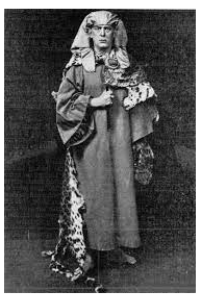look here for part I and Part II
By Embreis23
THE ECLECTICS: Eclectics are those folk who have felt the call of the old gods and goddesses, but do not find it necessary to try to imitate the religious practices of the ancient world and are not convinced by any particular Traditionalist path.
Eclectic Witches, Wiccans and Pagans: In the interest of being transparent, I will say that this represents my path. Those in this non-system usually agree that the Traditionalists are partly right, but are skeptical about their claims of great antiquity. Eclectics are also interested in learning from archaeology and ancient documents, but are not terribly interested in authenticity or historical accuracy, in part because they understand these things to be impossible. Eclectics seek to construct a personal religious vision from many sources, including the mythologies of many cultures, various occult traditions and by seeking direct visions of the Goddesses and Gods. Some Eclectics believe one’s experience of the divine is as much a matter of artistic or poetic creation as it is of perception. Eclectics differ from Popular Wiccans in that Eclectics are generally more aware of the origins of their practices and are less likely to claim some ancient source of authority for them.

Popular Wicca: I use this term to designate the many people who have come to Paganism through the internet and other pop culture sources. “Wicca” is the term they are most likely to adopt, although that’s not universal. Often they are isolated and have no contact with other Pagans except those they find on social media such as Facebook and TikTok, and have no tools to do serious research. As such, they often make connections that seem strange to people who are more schooled, sometimes they draw inspiration from popular culture (movies, gaming, etc.), and sometimes they make stuff up. But many are as sincere as any hard-nosed Traditionalist and they can be understood as Eclectics even if they don’t think of themselves that way. Unfortunately, and unconstructively, some people in more formal traditions make fun of and denigrate popular Wiccans.
Popular Wiccans probably represent the largest number of people who identify as Wiccans or Witches, maybe the largest number who could be called Pagans, but there is no binding tradition or practice among them and they represent a wide range of beliefs and opinions.
Christo-Pagans: There are people who combine Pagan, usually Wiccan, religious practices with veneration of Jesus Christ. Some of these regard Jesus and other Christian figures as deities in their more general Pagan pantheon; others take a view similar to that of early Christians, that the Pagan gods and goddesses exist but are subservient to Jesus or God the Father.
OTHER OCCULT TRADITIONS:
There are countless occult traditions, some of which are centuries old and some of which relatively modern. I cannot list all of these, but practitioners of Cabala, Hermeticists, Rosicrucians, Goetia or Ceremonial Magic, and Alchemy are all very much active and often found in Pagan spaces. More recent occult systems include Theosophy, Spiritualism, The Order of the Golden Dawn, and the teachings of G.I. Gurdjieff and Rudolph Steiner. There are many others. None of these are necessarily Pagan, but some are.
Satanism: This is probably the best place to address Satanism and its offshoots. Christians have accused Pagans and Heathens of worshiping “the devil” since at least the 2nd Century CE and most of the people described in this document will quickly deny any interest in any Christian devil, pointing out that Satan is essentially a god in the Christian pantheon.
That said, there are actual Satanists, also called Luciferians or Sethians, and some of them also identify as Pagan. Among these are Wiccans or Eclectics who simply regard Lucifer or Satan as a member of their pantheon, usually a god of rebellion and liberation, but not as a lord of evil.
There are also theistic Satanists, who believe in Satan in more or less the same sense that Christians do, but choose to worship him. Pagan Author Isaac Bonewits once described theistic Satanists as “Christians who’ve decided to cheer for the other team.”
There are also non-theistic Satanists, who deny that Satan/Lucifer exists as an actual entity, but use him as a symbol of their typically individualistic and sometimes surprisingly moralistic philosophy. Non-theistic Satanism is exemplified by The Church of Satan, which has made the news in recent years with dramatic political gestures, such as donating a statue of Satan to various state capitals and suing to protect abortion rights on the ground that abortion restrictions are an infringement on their 1st Amendment right to religious freedom.
Gnostics: This term was originally used by early Christians to describe other early Christians whom they regarded as heretics. Gnosticism is deeply intertwined with Classical Greek philosophy and mysticism, in particular that associated with Neo-Platonism. There are modern Gnostics, some of whom identify entirely as Christians, but some incorporate elements from Greek, Roman and Egyptian Paganisms.

MODERNISTS AND POSTMODERNISTS:
Thelema and the influence of Aleister Crowley: Thelemics are explicitly followers of the teachings of Crowley, the most controversial but probably the most famous (or infamous) of the early 20th Century occultists. Crowley, who announced the beginning of the Aeon of Horus in 1905, has influenced all of the groups mentioned here, although many would like to disown him because of his problematic personal behavior and political opinions. “Thelemic” is the general term for followers of this path, but there are a few specific organizations including the Ordo Templi Orientis (OTO) and the Gnostic Catholic Church.
Discordianism: Discordianism, which one of its founders described as either an elaborate joke pretending to be a religion or a religion pretending to be an elaborate joke, exalts Eris (Discordia), the Greek/Roman Goddess of Strife and Confusion. Discordianism has a “holy book,” the Principia Discordia. Many Eclectics accept Eris as a significant deity.
The Church of the SubGenius: I think it’s fair to say this started out as an elaborate joke, but grew into something much stranger. Look it up. I can’t possibly explain it.
Jediism: These folks find religious inspiration in the Star Wars films, especially in the concept of The Force. They’re not joking. A poll about 10 years ago found Jediism to be the fastest growing religion in the U.K.
New Age: As noted previously, this was originally a marketing category rather than a religious path, but a fairly consistent set of practices has become associated with that term, and there is considerable overlap with some forms of Paganism.

OTHER CULTURES:
It is commonly accepted that the term Pagan should not be applied to anyone who does not agree to be called a Pagan. Because of this, many religions of the world are not included in this document. If any of these religions decided to adopt the Pagan label, they would be welcomed to the category.
For example, Hinduism is arguably a Pagan religion, although many Hindus, but certainly not all, take offense at being identified with western Pagans. Esoteric Taoism and some strands of Buddhism have both influenced Wiccans and the Eclectics, as well as Crowley and H.P. Blavatsky who, in turn, influenced all of the Modern Pagan paths.
Some African Diaspora or other non-European folk traditions, such as Voudun, Santeria, Palo Mayombe and Santa Muerte resemble modern Paganism and/or serve a similar function in their cultures, but their adherents generally do not care to be called Pagans or Heathens. The same could be said for Native American religious traditions, including the Native American Church.
